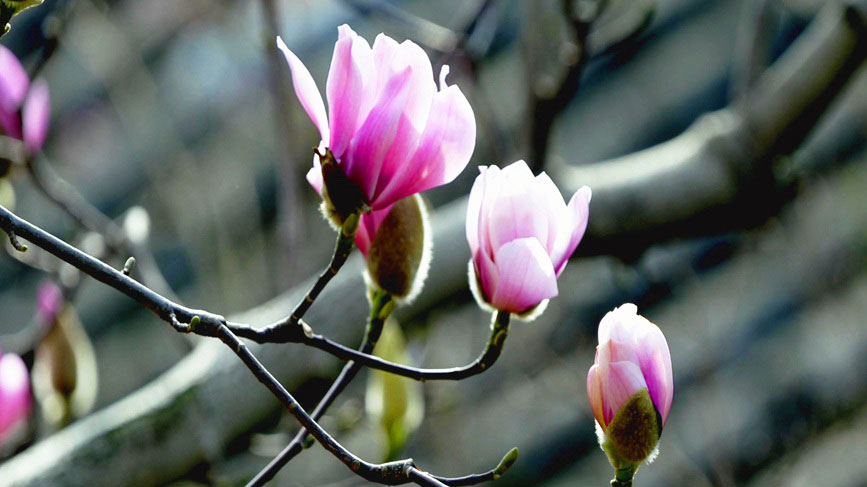China as the unwavering force of stability in an uncertain world
BEIJING, March 8 (Xinhua) -- Seated in a vibrant neighborhood cafe in Beijing, as my conversation with my Chinese friend drifted to the ongoing conflict between Ukraine and Russia, it quickly became evident that her perspective was refreshingly apolitical and impartial.
"Our country has always believed in non-interference and promoting peaceful diplomacy. It's important to remember that war only brings destruction and suffering, and that we should always strive for peace," she said while sipping her cappuccino.
Her perspective closely mirrors that of any common Chinese, emphasizing non-confrontation and peaceful coexistence in a deeply polarized world.
During a press conference held on Tuesday, Chinese Foreign Minister Qin Gang reaffirmed that the country's foreign policy places great emphasis on upholding global peace and fostering shared development.
As he eloquently fielded a barrage of questions from both local and foreign journalists, it provided insight into the Chinese people's worldview that recognizes the interconnectedness of nations and underscores humanity's shared destiny.
In a world fraught with conflict and uncertainties, it can be all too easy to lose sight of the beauty and potential of unity, but through its increasingly important role in global affairs, China has injected new vitality into the global economy and created new opportunities for development and cooperation.
Remarkable endeavors in this regard, such as the Belt and Road Initiative (BRI), the Global Development Initiative and the Global Security Initiative, embody the country's commitment to building a human community with a shared future, heralding a sense of assurance and stability for the world.
Rather than seeking to dominate or dictate, China instead sees itself as a responsible and compassionate leader, eager to work collaboratively with others to achieve shared goals and promote a brighter future for all.
PURSUING PEACE, PROMOTING TALKS
Throughout my travels in China, I encountered numerous instances that demonstrated the Chinese people's commitment to harmony and their aversion to conflict.
One such incident occurred in a bustling marketplace in the heart of Beijing. As I wandered through the narrow aisles, admiring the vibrant array of goods for sale, I noticed a heated argument brewing between two vendors. They were both gesturing wildly and shouting in rapid-fire Mandarin, their faces red with anger.
Just as I braced myself for a possible physical altercation, I was surprised to see a third vendor step forward. She was an elderly woman with a gentle smile and a kind demeanor, and she began to speak softly to the two quarreling vendors. Gradually, her calming presence diffused the tension, and the argument fizzled out. The three vendors exchanged nods of respect and returned to their work, the incident forgotten.
The Chinese people hold a deep-seated belief that harmony is the most precious aspect of life, which has been ingrained in their hearts and minds. This enduring wisdom can be found, among other oldest Chinese texts, in the Confucian classic "The Analects of Confucius," dating back over 2,000 years. The proverb "peace is precious" is a timeless reminder of this essential value, which still resonates strongly today.
Hence, it comes as no surprise that China advocates for peace and encourages dialogue to resolve the Ukraine crisis. To the Chinese, conflicts, sanctions and pressure do not offer viable solutions to the problem at hand. Rather, what is required is a calm and rational approach that prioritizes constructive dialogue.
China's position aligns with the universal aspirations of individuals who seek peace, recognizing that a political resolution to the conflict is in the collective interests of Russia, Ukraine and the global community.
In a personal reflection, Qin's recent trip to India has ignited optimism in me that the neighboring nations China and India, which are major emerging economies with far more common interests than differences, will experience positive developments in their bilateral relations.
As Qin rightly pointed out the two sides should view bilateral relations in the context of the once-in-a-century changes in the world, understand bilateral cooperation from the perspective of their respective national rejuvenation, and be partners on the path to modernization.
The Chinese foreign minister's visit to India was not a silver bullet, a magic cure for all the problems that have plagued the two nations in the past. But it was a vital step forward, a chance to build the trust and understanding that will be crucial in the years to come.
STRIVING FOR COMMON DEVELOPMENT
China's culture is an embodiment of harmony, cooperation and respect for diversity. It is a culture that values collectivism over individualism, where the greater good takes precedence over personal interests. Chinese culture encourages mutual assistance and peaceful coexistence, promoting a world where nations work together for the betterment of all.
In this very context, another anecdote that stands out in my memory is from a small village in the lush countryside of Hunan Province. I was visiting a local friend's extended family and had the opportunity to observe their daily routines and customs. One day, I noticed that the family's water supply had run low, and the patriarch of the household set out to retrieve more water from a nearby stream.
As he returned with the heavy buckets, I watched in amazement as he offered a portion of the water to his neighbors, who were also experiencing a shortage. The neighbors gratefully accepted the offering and reciprocated with small gifts of food and drink. It was a simple yet powerful act of kindness that exemplified the Chinese people's willingness to help each other and promote harmony.
The government work report submitted Sunday to the national legislature for deliberation pointed out that China, as a responsible major country, has played significant and constructive roles in enhancing international COVID-19 cooperation and addressing global challenges and regional hotspot issues, thus making important contributions to global peace and development.
The work report further affirmed that China remains firm in pursuing a strategy of opening up for mutual benefit, and will continue working to safeguard world peace, contribute to global development, and uphold the international order.
The country is playing an increasingly important role in global affairs. For instance, the BRI has provided a popular cooperation platform for the world.
Since its inception in 2013, the initiative has garnered support from 151 countries and 32 international organizations. To date, these partnerships have resulted in the signing of over 200 cooperation agreements with China, which have catalyzed nearly one trillion U.S. dollars in investments, generated 420,000 jobs for countries along the route, and lifted almost 40 million people out of poverty.
The importance of the BRI cannot be overstated. In a world where geopolitical tensions and economic inequality are on the rise, the initiative represents a beacon of hope and a path forward. As the Chinese people aptly describe it: "The BRI is a high-quality public good initiated by China, built by the parties involved, and shared by the world."
STAY UNITED TO TIDE OVER DIFFICULTIES
Perhaps the most striking illustration of the Chinese people's solidarity and cooperation was what I once espied in Hunan's Fenghuang County. I had the privilege of witnessing a traditional music performance in a grand outdoor amphitheater, where hundreds of people had gathered to enjoy the beautiful melodies and graceful dances.
As the performance reached its climax, a sudden downpour of rain drenched the audience, threatening to ruin the evening's festivities. But instead of becoming disgruntled and seeking shelter, the crowd banded together, sharing umbrellas and creating impromptu shelters out of tarps and blankets. The performers continued their stunning display, unfazed by the rain, and the audience cheered and clapped in unison, united in their joy and appreciation.
Along the same vein, China's unwavering commitment to fostering a new type of international relations based on mutual respect, equity, justice and win-win cooperation is demonstrated unequivocally through its tangible actions.
From this vantage point, it becomes clear why Qin denounced the U.S. characterization of China as its primary rival and biggest geopolitical challenge, saying that this represents a serious distortion in its perception and views of China.
In response, he called on the U.S. government to work with China to explore the right way to get along with each other to the benefit of both countries and the entire world.
In a world where uncertainty seems to reign supreme, China's steady hand provides a sense of much-needed reassurance. Whether in the realm of economics, diplomacy, or security, the country's unwavering commitment to stability and progress stands as a powerful testament to the resilience and strength of the human spirit.
As the world looks to the future with trepidation, China stands tall as a shining example of what can be achieved through cooperation, determination, and unwavering commitment, beaming a guiding light that shows us all the way forward toward a brighter, more prosperous future for all.
From the depths of its rich culture to the visionary concept of a human community with a shared future, China provides reassuring stability in an uncertain world.
Photos
Related Stories
- How China brings prosperity, stability to world
- Major events can promote global prosperity
- Belt and Road Initiative participated by three-fourths of world's countries: FM
- Belt and Road Initiative a high-quality public good: Chinese FM
- Belt and Road Initiative creates 420,000 jobs for participant countries: FM
- Chinese dredger contributes to high-quality construction of Belt and Road
Copyright © 2023 People's Daily Online. All Rights Reserved.









